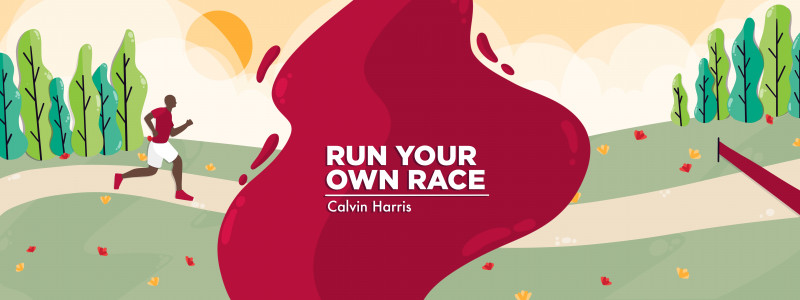COVID-19 Has Made Marathon Training Harder

I’ve been learning the hard way that recovery from COVID-19 is in some ways reminiscent of dealing with sarcoidosis.
After being diagnosed with COVID-19 in early January, quickly obtaining monoclonal antibodies to aid in my recovery, and then completing a 20-day isolation period due to my immunocompromised state, I was very excited to get back outside.
Prior to my COVID-19 diagnosis, I was training for my first marathon in May. In November, I hope to run the famous New York City Marathon, and the upcoming May marathon would be a chance to learn how it feels to run such a long distance.
Running has taught me plenty about managing pain, and I love the challenge of running with pulmonary sarcoidosis. But I had never run quite that far before. I have run three half-marathons of just over 13 miles, which weren’t easy, but the thought of doubling that was a challenge I was looking forward to.
I have no idea whether finishing the run is even possible with my version of pulmonary sarcoidosis, but the best way to find out is to try. While I certainly want to finish the marathon, the journey of seeing what is possible with sarcoidosis is admittedly the appeal of my attempt.
But then came COVID-19, which took almost a month of my training time away from me. After isolation and various negative COVID-19 tests, I’m finally cleared to train again. But it’s tough!
While I haven’t experienced any long COVID-19 symptoms, such as brain fog, I have been struggling mightily with fatigue and insomnia. Both had been prior challenges with sarcoidosis, though I generally had managed them fairly well. But after COVID-19, insomnia and fatigue went from occasionally challenging to downright awful. And when you struggle with insomnia and fatigue, you are bound to struggle with training.
I am slowly running again, though I am measuring running by the amount of time I run, versus the number of miles. Today I was able to run 45 minutes without stopping, which I consider a successful run post-COVID-19. However, just a month ago, I would run much longer than that without difficulty.
Admittedly, today wasn’t that tough all in all, but it is clear that I need a lot more training before I am truly comfortable running or ready for a marathon. So, I am now in an interesting period of training and testing my limits.
I need to run to get my body in shape for the marathon. I must push myself to have a shot of meeting my goal. But I also must be mindful of not pushing myself too hard or fast.
I suppose that’s the nature of any exercise program: If you don’t push yourself hard enough, then you might not get the results you seek. But if you push yourself too hard, then you might find yourself injured.
My 16-week marathon training plan is now a 12-week plan. From chatting with more experienced runners, it sounds like I might still be able to pull this marathon off, but it won’t be easy. Truth be told, whether I am ultimately successful or not, I am really excited to attempt it.
But hey, when it comes to sarcoidosis, and now COVID-19, when is it ever easy?
Note: Sarcoidosis News is strictly a news and information website about the disease. It does not provide medical advice, diagnosis, or treatment. This content is not intended to be a substitute for professional medical advice, diagnosis, or treatment. Always seek the advice of your physician or other qualified health provider with any questions you may have regarding a medical condition. Never disregard professional medical advice or delay in seeking it because of something you have read on this website. The opinions expressed in this column are not those of Sarcoidosis News or its parent company, Bionews, and are intended to spark discussion about issues pertaining to sarcoidosis.








DebbraP
Wow! Just the title of your article "Covid-19 Has Made Marathon Training Harder" is impressive! The title says nothing about you having Sarcoidosis...as if you don't. I'm inspired because you don't let Sarcoidosis define you. You have it but it hasn't prevented you from training. The Covid did.
It is truly awesome that someone with an incurable illness hasn't let himself be beaten by that very fact alone and instead, you are focused on training for a marathon. Sometimes my short jaunts down the hallway at the house can be a little challenging. Some days however are easier. I'm on oxygen 24/7. Today I thought of you running and kind of laughed at myself thinking I can certainly make it down a short hallway! Even tho you have not run the marathon just yet, you've accomplished a great deal already. Some of us need this kind of inspiration and to know that despite Sarcoidosis and despite the Covid, accomplishments CAN be made. Best of luck to you! Keep us updated on the training.
Drew Lyon
We are all on different sarcoidosis journeys. Mine started five years ago when imaging for a pulmonary embolism revealed large lymph glands (eventually diagnosed as sarcoidosis by biopsy). Some people will have sarcoidosis that is progressive and some don't. We can't predict which sarcoid journey we are on and it will take time to figure out. I have been blessed with no progression so far and I have started back exercising regularly. I am stronger and a bit lighter than I used to be. Keep up your running and marathon training. I cross country ski for fitness & training and a week ago I completed the 55 kilometer Canadian Birkiebeiner ski in Edmonton ( rather slow, but steady !). Good luck with training for your first marathon (and also good luck with your second,......and third....etc).